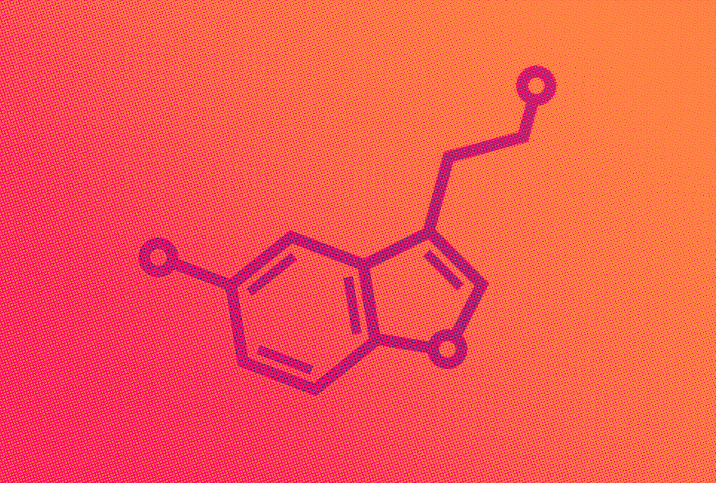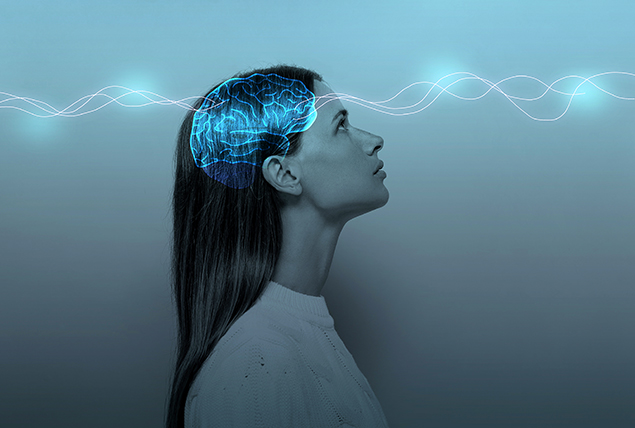Beyond Being a 'Feel-Good' Hormone, What Is Serotonin?

Serotonin is a neurotransmitter and hormone produced in different parts of the body. The modern story of this chemical messenger dates back to the 1930s, and according to some experts, the discovery of serotonin is linked to the birth of neuroscience.
Apart from playing a fundamental role in neurotransmission—the transfer of important information between neurons—serotonin also regulates a number of other physiological processes.
OK, but what is serotonin? In short, it has multifaceted roles in healthy human functioning, including sexual health.
Serotonin is fundamental
Serotonin is fundamental to many bodily processes. It is produced in the brain to control electrical activity by modulating impulses between neurons. It is also produced in the gut, where it eventually finds its way to circulate throughout the body and organ systems.
Researchers like to make a clear distinction between gut-derived serotonin (periphery) and brain-derived serotonin (central). These two serotonergic systems are separated by the blood-brain barrier, which allows necessary substances to reach the brain but keeps out harmful ones.
The body cannot produce serotonin on its own. It needs an essential amino acid called tryptophan, which is found in a variety of foods, such as chicken, turkey, eggs, milk, cheese, peanuts and fish. Tryptophan comes in two forms, TPH1 and TPH2. The former produces the serotonin in our gut, while the latter produces the serotonin in the brain.
What are serotonin's functions?
In the central nervous system, serotonin helps regulate the transmission of impulses and signals between neurons. The most widely accepted functions of serotonin include mood and sleep regulation and anxiety control.
Mood regulation
Often referred to as the "feel-good" neurotransmitter, serotonin plays a key role in regulating mood, however, it is just one of several neurotransmitters involved in mood regulation. The outsized role it was once credited with may not be as large as previously thought.
The exact mechanisms by which it affects mood are not fully understood, and recent research has reexamined the serotonin theory of depression, which has been widely accepted and taught for decades. It likely plays a role but isn't the star of the show. More research is needed.
Sleep regulation
Serotonin is also involved in regulating sleep-wake cycles. Specifically, it helps to promote wakefulness during the day and to facilitate the onset of sleep at night. It does this when it is converted into another neurotransmitter called melatonin, which is involved in regulating the body's circadian rhythm.
However, some researchers believe we still don't understand the exact mechanism by which serotonin regulates the structure of sleep, as it is multifaceted and complex.
Anxiety control
Serotonin is believed to play a role in regulating anxiety as well. Specifically, it helps to inhibit the activity of certain brain regions that are involved in the "fight or flight" response that can lead to feelings of anxiety or panic.
Some experts even claim that serotonin regulates nearly all human behavioral processes, with the authors of one paper stating it is difficult to find a behavior not influenced by this neurotransmitter.
Some of these behaviors include the following:
- Perception
- Anger
- Aggression
- Memory
- Sexuality
- Attention
- Stress
- Fear
- Addiction
Almost all serotonin produced in the body (90 percent to 95 percent) comes from the gut or gastrointestinal tract, and the rest is produced in the brain, according to researchers.
The gut-derived serotonin, which experts refer to as periphery serotonin, flows in the blood. While further research is required to better understand the specific mechanisms at play, periphery serotonin is involved in various other functions.
"Recent scientific advances demonstrate that serotonin has a number of important roles to play in numerous parts of the human body outside the central nervous system, including in pulmonary physiology, gastrointestinal and endocrine function, and cardiovascular health," said Faisal Tai, M.D., a board-certified psychiatrist with Psychiatry of Texas in Houston and the CEO of online mental health provider PsychPlus. "Serotonin also plays a role in inflammatory responses and liver regeneration."
How do high and low serotonin levels affect sexual health?
"Serotonin appears to be a key inhibitory modulator of sexual desire because it decreases the ability of excitatory systems to be activated by sexual cues," said Jamie Bichelman, a mental health researcher in New York City with master's degrees from Harvard University and New York University. "In general, low serotonin is linked to higher sexual activity in both men and women."
Conversely, high levels of serotonin can lead to lowered libido. Some people with mental health complications are prescribed selective serotonin reuptake inhibitors (SSRIs); in fact, SSRIs are the most commonly prescribed antidepressants.
This type of drug increases the level of serotonin in the brain by blocking the reabsorption, or reuptake, of serotonin into neurons. This makes more serotonin available to improve the transmission of messages between neurons, helping to regulate mood and anxiety. The trade-off is that for some patients, SSRIs can affect sexual health by decreasing their sex drive.
Women may experience difficulty sustaining arousal and reaching orgasm. Vaginal dryness is another potential side effect. Men are prone to side effects that include erectile dysfunction (ED), delayed ejaculation and low libido.
"SSRIs are used by millions of Americans to alleviate the effects of depression. However, they do have some significant side effects. For example, serotonin can have a negative effect on sexual experience and function," Tai said. "Such sexual side effects can be the case with up to 70 percent of the people who take such medications. It is highly advisable that patients consult with their physicians to better understand what their treatment options are to avoid such side effects."
Side effects of SSRIs
SSRIs are generally considered safe, according to Danielle Kelvas, M.D., a primary care physician and writer in Johnson City, Tennessee, and the chief medical advisor at Sleepline, a sleep health information resource.
SSRI side effects can be plentiful, however, including:
- Nausea
- Vomiting
- Diarrhea
- Headache
- Drowsiness
- Dry mouth
- Vaginal dryness
- Insomnia
- Nervousness
- Agitation or restlessness
- Dizziness
- Sexual problems, such as reduced sexual desire, difficulty reaching orgasm or inability to maintain an erection
- Feeling agitated, shaky or anxious
- Feeling or being sick
- Indigestion
- Constipation
- Loss of appetite and weight loss
- Blurred vision
- Excessive sweating
- Sleeping problems (insomnia) or drowsiness
- Gastrointestinal distress
- Weight changes
"The list is almost endless because serotonin receptors are everywhere throughout the body," Kelvas noted. "Not everyone experiences these side effects, and some people may experience different or no side effects at all. In my anecdotal experience, lowering the dose doesn't seem to make a difference. If someone is having negative sexual side effects from a drug, you're better to switch medications or try lifestyle modifications to make up for it [such as] lube, vibrators, etcetera."
It's important for people who are prescribed SSRIs to work with their primary care provider or psychiatrist to understand how their medications are affecting their sexual function and to what extent. If the cons of SSRIs outweigh the pros, there may be other options to help improve mental health without the sexual side effects.
Cognitive behavioral therapy (CBT) is one example. Findings vary but a retrospective study that took 50 years of data into account suggests that CBT "has been shown to be as efficacious as antidepressant medications [on average] in the acute treatment of nonpsychotic depression, although some patients will do better on one than on the other."
Serotonin is just one small part of overall sexual health, though. Along with depression and anxiety, a history of sexual trauma can play a significant role. Diet, sleep and exercise are also factors in a person's sexual well-being.
How is serotonin misunderstood?
Myths surround serotonin. Kelvas highlighted a few of them:
Myth: Serotonin is solely responsible for causing depression
"This is not true," Kelvas said. "While serotonin has been linked to mood and depression, it is not the sole cause of depression. Other factors, such as genetics and environmental stressors, can also play a role in the development of depression."
Myth: Increasing serotonin levels can make you happy
"While serotonin is involved in regulating mood, it is not the only factor involved in feeling happy or content. Other neurotransmitters, such as dopamine, are also involved in regulating mood," Kelvas explained.
Myth: Low serotonin levels are the cause of all mental health issues
Serotonin levels may be involved in certain mental health issues, Kelvas acknowledged, but she mentioned there are many other possible causes.
"Mental health issues are complex and can involve a variety of factors," she said.
Myth: Serotonin is present only in the brain
"[That] is not the case," Tai said. "As Psychology Today magazine points out, approximately 90 percent of serotonin is made in your gut, where it actually assists with motility and contractions regulation."
Tai added that about 8 percent of serotonin exists in the bloodstream, and only 1 percent to 2 percent of serotonin exists in the brain. Too many people believe that the higher the levels of serotonin, the better. That is not accurate.
"In fact, too much serotonin from medications can cause 'serotonin syndrome,' with symptoms ranging from tremors to delirium," he said. "Serotonin syndrome can actually be life-threatening."
Serotonin's many roles in the body are still being researched and defined. Beyond mood, the hormone and neurotransmitter affects sleep, anxiety, sex drive, metabolism and more. Keeping its levels balanced is one key to well-being and a healthy sex life.


















